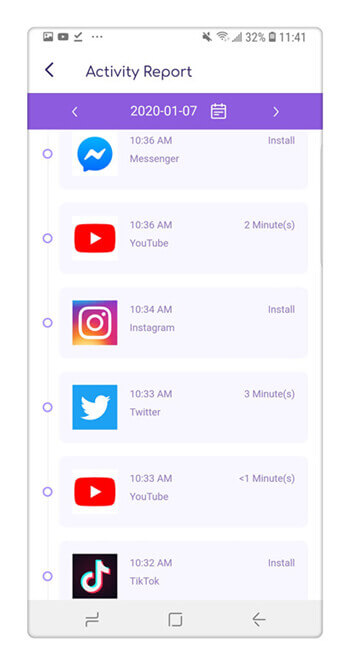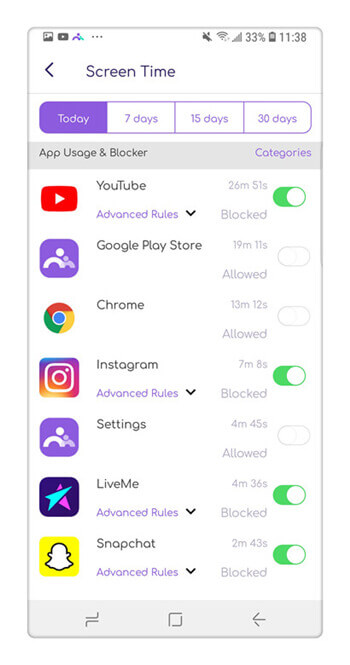How Common is Teen Pregnancy & What Parents can Do
Teeange Pregnancy & Parents' Role
ALL TOPICS
- YouTube Parental Control
-
- How to see your YouTube history?
- Put parental controls on YouTube
- Delete TikTok Account without Phone Number
- Ways to block YouTube channels
- Ways to Get Somone's IP Address and Hide IP Address
- A complete guide on YouTube parental control
- Kids safe YouTube alternative
- Top 5 TikTok Alternatives
- Methods to restrict YouTube adult content
- Social Media App Parental Controls
- Parental Control Tips
Dec 12, 2025 Filed to: Parenting Tips Proven solutions
Every parent is terrified of the thought of their teenage daughter getting pregnant while in school. To get a clear picture of teenage pregnancy we need to familiarise ourselves with various facts associated with teenage pregnancy.
According to the Centers for Disease Control and Prevention in 2017, 194377 babies were born to teen women aged 15-19 years. This is a record drop of 7% from 2016 due to teens abstaining from sexual activity and the use of birth control as compared to previous years. In the U.S teen pregnancy remains to be higher as compared to other western industrialized countries. Also, geographic and ethnic/racial disparities in the rate of teen birth rates persist.
Effects of Teen Pregnancy on Education
Teenage pregnancy is a problem that affects all societies in the world. Several factors have been attributed to teenage pregnancy but the most persistent challenge is its interference with the teenager’s education. The following are the adverse effects of teenage pregnancy on education.
Teen pregnancy is accompanied by lots of responsibilities that interfere with regular school attendance. These distractions include regular visits to the doctor and morning sickness. As a result, they miss class attendance and complete less schooling than non-pregnant teens. Teens that become pregnant are unlikely to complete high school and according to Hofferth, Reid, and Mott 2001 about one in three teenage dropouts are caused by pregnancy.

Teens that get pregnant have an increased desire to finish school despite the distractions associated with childhood pregnancy. Most teens who get the pregnant feel that getting an education is not important and hence fail to reprioritize it in their lives. However, according to research, pregnancy is a motivation for teenage parents to complete their education, and some even consider a college education for the first time. Unfortunately, these desires are not fulfilled since they are overwhelmed by child-rearing. Pregnant teens usually have a gap between their educational desires as compared to their nonpregnant counterparts.

Friends play a very important role in the educational lives of pregnant teens. When pregnant teen has broad social support they are more likely to have lower levels of stress and higher levels of well-being and confidence. School peers can be of value to the school life of a pregnant teen when she faces academic challenges like missing school and medical issues. They may share academic resources and offer encouragement for persistence.

Due to the constant missing of classes and potentially dropping out, young mothers are unable to get decent jobs. Higher education leads to a well-paying and decent job enabling the teen to take care of themselves and their child. However, low levels of education endanger the mother to a life of poverty and fewer opportunities in the workplace as compared to other non-parenting teens.
What parents can do to prevent teen pregnancy?
According to the National Campaign to Prevent Teen Pregnancy the following tips go in handy in helping parents:
- Be clear to them on your sexual attitudes and values.
Thinks through several questions to make it easier to talk with your child.
- How do you feel about teenage pregnancy?
- How do you feel about sexual abstinence among teens?
- Talk to your kids about sex and love at an early age.
Get them to know about your stand on sex. Teach them the difference between love and sex and how the body works. Also listen to them carefully when discussing these sensitive issues to get to know their understanding of the topical issue of sex. You should understand that talking with your kids about sex will not encourage them to become sexually active but will enable them to understand the issue of sex and how to avoid teenage pregnancy. Also, create a friendly relationship with your kids so that they can freely ask you anything without fear or shame.
- Monitor your child’s activities.
It is important to know where your child is at all times. What are they up to? Are they safe? Are they doing something constructive? Ensure that they are under the care of a responsible person if they are not with you. Sometimes our teens may be accused of being too snoopy but you can also help them understand that you are a caring parent and would not want anything to happen to them.
- Know your kid's friends and families.
Your kid’s friends have a strong influence on his or her behavior. Help your teenager to choose friends from families with similar values. Welcome their friends to your home and talk to them frequently. Also, talk with their parents regularly about curfews and some common regulations and expectations
- Make sure that you are familiar with what your kids are accessing online.
Sex messages via social media, television, the internet, movies, and magazines can be at odds with your values. Media literacy helps you regulate what you and your family are watching, listening to, and reading. Help your kids be critical thinkers through analyzing what they are reading and listening to. Also do not allow TVs in your teen’s room since you will not be able to control what they are watching. You can make your values known and control what happens in your house. You can cancel subscriptions, turn off the subscriptions and be clear on what music and movies are acceptable. You can also use the FamiSafe app to regulate content consumed by your teenage daughter on social media. Here are the features of FamiSafe.
*Explicit Content Detection

This feature enables you to detect suspicious photos like teen nude selfies, porn photos, porn screenshots in the kid’s galleries. Once suspicious photos is detected, parents will be alerted. This helps parents note porn addiction or sexual harassment when online. You can also check the risky photos downloaded from social media and other websites.
The explicit content detection feature helps parents monitor text messages in social media apps. You can create and key inoffensive words to be detected and get real-time alerts when suspicious words are detected.
*Activity report

Checking your kid’s phone activity timeline helps you know the apps that are installed and uninstalled and the ones that your kid has used recently. You can know how your kid spends their time every day. This feature helps you to stop checking your kid’s phone every day but have the information remotely. This makes the kid feel like you are not snooping around.
You can also receive timely communication if your kid is insulted in installed or uninstalled apps. Get to advise your kid on malicious content in installed apps and potential danger associated with them. This app enables parents to figure out if their kids are having trouble falling asleep, or are playing games behind their backs.
*App blocker

This feature helps parents view the app list and how much time the kid spends on each app per day. Get information on how much time they spend on games and when they stay up late on social media. You can also block apps based on age and categories in IOS and Android. This feature sends real-time warning notifications to parents when kids try to access blocked apps.
- Web Filtering
- Location Tracking & Geo-fencing
- App Blocker & App Activity Report
- Screen Time Limit & Schedule
- Explicit Content & Suspicious Photos Detection
In conclusion, teenage pregnancy is an issue that affects every country in the world. The good news is that it can be avoided by parents spending their time with their teenage daughters and discussing some of these issues in a friendly way. However, if you find this hard to do there are applications like FamiSafe that can provide you it sufficient information about your kid's whereabouts and notify you early on of deviant behavior. It is our responsibility as parents to keep our teens safe from this unforgiving world.



Thomas Jones
chief Editor